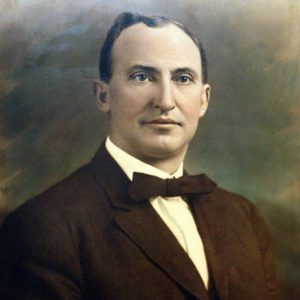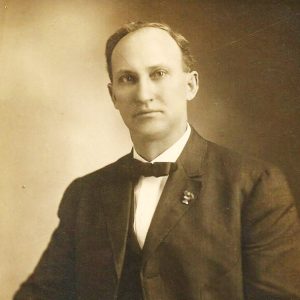calsfoundation@cals.org
George Washington Hays (1863–1927)
Twenty-fourth Governor (1913–1917)
George Washington Hays was a key figure in deciding issues on prohibition and women’s rights. He served as governor during an era of significant interest in progressive reforms, but he did not unreservedly align himself with the reformers.
George Hays was born at Camden (Ouachita County) on September 23, 1863, to Thomas Hays, a farmer, and Parthenia Jane Ross. Hays himself farmed until he was twenty-five years old, worked as a store clerk for six years, and taught school for three months. After receiving a legal education at Washington and Lee University in Lexington, Virginia, and studying with the firm of Gaughan and Sifford in Camden, Hays began his own law practice in his hometown in 1897.
On February 20, 1885, he married Ida Virginia Yarborough. They had two sons.
Hays served as probate and county judge for Ouachita County from 1900 to 1905. He returned to his law practice in Camden until October 31, 1906, when he became judge of the Thirteenth Judicial District. Reelected in 1910, he resigned before completing his second term when he was elected governor in 1913. The 1913 special election was held to fill the vacancy created when Governor Joe T. Robinson was elected to the U.S. Senate.
Hays relied on the support of remnants of former governor Jeff Davis’s faction of the Democratic Party for support. His opponent, Stephen Brundidge, drew his strength from the towns and cities. Hays allied himself with the politically powerful Eugene Williams, treasurer of the St. Francis Levee District Board, a group that was a major influence in the politics of the Delta region. Brundidge accused Hays of backroom dealings with the levee board. When the spring primary election seemed to be extremely close, Phillips County, a Delta county influenced by the levee board, held back its votes until the outcome in the rest of the state became evident. Then Phillips County, which was a strong Brundidge area, registered a large vote for Hays. Despite charges of vote manipulations in eastern Arkansas, Hays easily won against Audrey L. Kinney and Dan Hogan in the fall 1914 general election.
Hays came to the governor’s chair at a time of rising reform sentiment in the state and nation: Woodrow Wilson’s crusades for antitrust, banking, and tariff reform all occurred during Hays’ election campaign and tenure as governor. But Hays showed much less interest in the goals of the Progressives than one of his predecessors, George Washington Donaghey, or his successor, Charles Brough. He did not actively press for change, and critics charged him with inactivity, irresolution, and vacillation. His major preoccupation seemed to be creating a loyal political machine by gaining control of the board of charities and the levee board. Hays had no opposition in the Democratic gubernatorial primary election held in March 1914. Andrew L. Kenney, the Republican candidate, described Hays as a “man of high character” but condemned him for spending too much time “building up or attempting to build up a political machine.” Hays called for a strict economy to keep the state solvent. Hays achieved an overwhelming victory in the general election on September 14, 1914.
Prohibition was a major issue in Hays’s administration. Under the Going Law of 1913, liquor licenses could not be granted in a community unless a majority of the white voters signed a local-option petition. Arkansas had become an almost totally dry state by 1915. The liquor forces determined to eliminate the Going Law by submitting the prohibition question to the people at a general election. Hays changed his position on the prohibition issue several times. During his campaign, he joined forces with prohibitionists who favored a statewide prohibition law, and in his inaugural address, he vigorously assailed the evils of liquor. Later, he aligned himself with the wet supporters by asking the legislature to resubmit the question to the voters and by supporting the wet candidate for president of the Senate, but the Senate rejected his advice and chose a strong prohibitionist. Hays expressed his embarrassment for supporting the wets and promised to call for a strong prohibition measure. With his support, the legislature passed the statewide prohibition bill, making it illegal after January 1, 1916, to manufacture or sell liquor in Arkansas.
In a controversial veto, Hays struck down a bill to make the membership of the St. Francis Levee Board elective. He preferred to keep appointive power intact despite pressure from Delta-area legislators to reform the board. Hays worked to defeat a primary election reform bill designed to end the vote manipulation that had often occurred in eastern Arkansas.
During the 1915 session, the legislature passed a number of significant progressive measures that received Hays’s approval. The Alexander Road Improvement Act provided for creation of road-improvement districts governed by commissions with power to issue bonds. The legislature also enacted a “blue sky law” to protect investors from stock and bond fraud, a law to regulate chiropractors, and an act to regulate the methods of weighing coal at mines. Hays was not a champion of women’s rights. He had once said that giving the right to vote to women was against God’s law. Nevertheless, women achieved important gains during the Hays administration. Their working day was restricted to nine hours, with a six-day maximum week. The legislature gave women the right to enter into contracts and to own property and submitted to the voters an amendment for women’s suffrage.
After Hays left office in January 1917, he practiced law in Little Rock (Pulaski County) and Camden. After suffering complications resulting from influenza, he died on September 15, 1927 in Little Rock. He is buried in Camden.
For additional information:
Donovan, Timothy P., Willard B. Gatewood Jr., and Jeannie M. Whayne, eds. The Governors of Arkansas: Essays in Political Biography. 2d ed. Fayetteville: University of Arkansas Press, 1995.
George Washington Hays Miscellaneous Papers. Special Collections. University of Arkansas Libraries, Fayetteville, Arkansas.
Richard L. Niswonger
Siloam Springs, Arkansas
This entry, originally published in Arkansas Biography: A Collection of Notable Lives, appears in the CALS Encyclopedia of Arkansas in an altered form. Arkansas Biography is available from the University of Arkansas Press.








Comments
No comments on this entry yet.